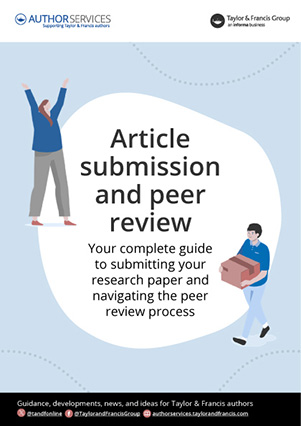Peer review appeals and complaints from authors
Taylor & Francis journals follow the Committee on Publication Ethics (COPE) guidelines on appeals to journal editor decisions and complaints about a journal’s editorial management of the peer review process.
Editor decisions
We welcome genuine appeals to editor decisions. However, you will need to provide strong evidence or new data/information in response to the editor’s and reviewers’ comments.

For scholarly articles of an opinion nature an appeal is less likely to overturn an editor’s decision. These include, viewpoints, commentaries, and book reviews, where editorial judgment about readability and relevance weighs most heavily.
In any case, all opinion-led articles should be evidence-based and fully referenced. For opinion-led articles, you should always present your evidence and explain how it led you to form your opinion.
Publishing tips, direct to your inbox
Expert tips and guidance on getting published and maximizing the impact of your research. Register now for weekly insights direct to your inbox.
Editors don’t expect frequent appeals and they rarely reverse their original decisions. Therefore, if you receive a decision to reject your manuscript, you are strongly advised to submit to another journal. The decision to reject a manuscript for publication will often involve the editor’s judgment of priority/importance. These are things which authors usually cannot address through an appeal. However, if you believe that there is a case to be made for a genuine appeal please follow the instructions below.
I want to appeal an editorial decision
If you wish to appeal a journal editor’s decision, please submit an appeal letter to the journal’s online editorial office. Please address this to the editor and explain clearly the basis for an appeal.
You should:
Detail why you disagree with the decision. Please provide specific responses to any of the editor’s and/or reviewers’ comments that contributed to the reject decision.
Provide any new information or data that you would like the journal to take into consideration.
Provide evidence if you believe a reviewer has made technical errors in their assessment of your manuscript.
Include evidence if you believe a reviewer may have a conflict of interest.
After receiving the appeal, editors may involve any associate editors who handled the peer review of the original submission and/or Taylor & Francis, depending on the nature of the appeal. Editors may confirm their decision to reject the manuscript, invite a revised manuscript, or seek additional peer- or statistical review of the original manuscript.

Editors will consider one appeal per article and all decisions on appeals are final. The timely review and decision-making process for new submissions will take precedence over appeals.
For more information about a journal’s appeals procedure please contact the editor.

I want to comment on the editorial management of a journal
Where you, as an author, wish to comment on aspects of the journal’s editorial management please contact us and select “Other” as the topic.

It is important to note that Taylor & Francis cannot consider appeals where the subject matter is the focus of on-going legal proceedings. Similarly, we reserve the right to decline, suspend or to discontinue an appeal made under this policy in the event that legal proceedings commence and the claim concerns the same subject matter as the appeal.